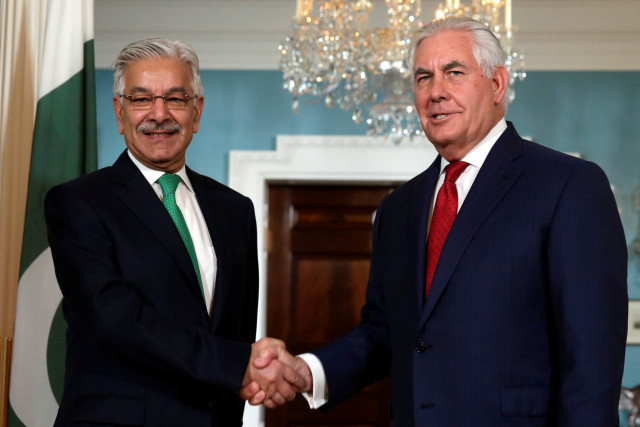Trump’s Afghan plan: US agrees to assuage Pakistan’s concerns
Asif tells Tillerson US policy based on inadequate recognition of Islamabad’s sterling contribution in terror fight

U.S. Secretary of State Rex Tillerson (R) shakes hands with Pakistan's Foreign Minister Khawaja Muhammad Asif before their meeting at the State Department in Washington, U.S., October 4, 2017. PHOTO:REUTERS
The statement, which came after talks between Secretary of States Rex Tillerson and Foreign Minister Khawja Asif in Washington, said the United States underlined the importance of Pakistan’s critical role for peace and stability in Afghanistan.
The high-level talks were held against the backdrop of simmering tensions between Pakistan and the US. Islamabad is upset over Trump’s new roadmap for Afghanistan which on the one hand seeks a greater role for India in the region and on the other hand questions Pakistan’s credentials in the fight against terrorism.
Tillerson denies considered resigning from Trump admin
In his policy speech on August 21, Trump had said Pakistan would have to change its approach of supporting and harbouring certain militant outfits. Pakistan has rejected the allegations and says it could not be made scapegoat for failures in Afghanistan.
During the talks at the State Department, the foreign minister pointed out that Pakistan was winning its war against terrorism. In contrast to other countries, incidents of terrorism in Pakistan have seen a marked decline – with a salutary impact on economic and commercial activity.
“This was made possible because Pakistan has pursued zero-tolerance and indiscriminate approach in its campaign against all terrorist and militant groups,” he told the top US top diplomat.
According to the Foreign Office statement, Asif conveyed to Tillerson Pakistan’s concerns over the new US plan for Afghanistan. He informed the secretary of state about the strong public reaction in Pakistan to the US policy based on inadequate recognition of Pakistan’s sterling contribution in the fight against terrorism.
In addition to huge human and material cost incurred by Pakistan, the foreign minister said, “our cultural ethos as a moderate state had suffered due to protracted instability in Afghanistan”.
He emphasised that Pakistan and the US shared a common desire for peace and stability in Afghanistan and the region at large. Pakistan, he added, seeks a broad-based relationship with the US, building on a seven-decade-long history of successful cooperation.
Religious freedom under attack in Pakistan: Rex Tillerson
Tillerson acknowledged and appreciated the sacrifices rendered by the people and armed forces of Pakistan in the struggle against terrorism. He agreed that cooperation between Pakistan and the US in Afghanistan was crucial to achieve durable peace and stability in the region.
The secretary of state remarked that Pakistan’s interests and concerns would be accommodated since its role was critical to President Trump’s South Asia Strategy. He added that the future stability of Pakistan was an important element of the strategy.
Asif stressed the need for an Afghan-led and Afghan-owned political approach to achieve peace and stability in Afghanistan. He conveyed Pakistan’s concerns with regard to ungoverned spaces within Afghanistan, from which attacks against Pakistan continued to be planned and carried out.
The minister urged the US to take note of the gross human rights violations by Indian security forces in occupied Kashmir. He said peace in South Asia would remain out of reach until resolution of all the longstanding disputes, including the core dispute of Jammu and Kashmir.
Inviting Secretary Tillerson to visit Islamabad to continue bilateral discussions, the foreign minister stressed that a broad-based and structured framework for dialogue would best serve the two countries’ mutual interests.
Tillerson accepted the invitation to visit Pakistan. Both sides agreed to remain constructively engaged with a view to achieving the shared objectives of peace, stability and economic prosperity in the region.
Asif is visiting the US on the invitation of Tillerson. Their meeting came as US Defence Secretary Jim Mattis told the House Armed Services Committee that he would be traveling to Islamabad soon.
He did not give details but said at the committee hearing the US would try ‘one more time’ to work with Pakistan in Afghanistan before Trump turned to options to address Islamabad's alleged support for militant groups.
“We need to try one more time to make this strategy work with them, and if our best efforts fail, the president is prepared to take whatever steps are necessary,” Mattis said.
Asked by a Congressman whether revoking Pakistan's major non-Nato ally status was amongst the options being considered to deal with Islamabad, Mattis said: “I am sure it will be.”
(With additional input from Reuters)



















COMMENTS
Comments are moderated and generally will be posted if they are on-topic and not abusive.
For more information, please see our Comments FAQ